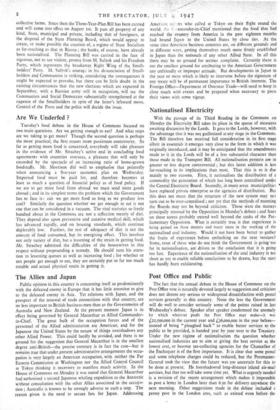The Allies and Japan
Public opinion in this country is concerning itself so predominantly with the defeated enemy in Europe that it has little attention to give to the defeated enemy in Asia. Yet relations with Japan, and the prospect of the renewal of trade connections with that country, are no less important to British business-men than ,to the Governments of Australia and New Zealand. At the present moment Japan is in effect being governed by General Macarthur as Allied Commander- in-Chief. The great bulk of the occupation forces and of the personnel of the Allied administration are American; and for the Japanese the United States by the nature of things overshadows any other Allied Power. This could hardly be avoided, and there is no ground for the suggestion that General Macarthur is in the smallest degree anti-British—the precise contrary is in fact the case—but it remains true that under present administrative arrangements the occu- pation is very largely an American occupation, with neither the Far Eastern Commission at Washington nor the Allied Control Council at Tokyo thinking it necessary to manifest much activity. In the House of Commons on Monday it was stated that General Macarthur had authorised a second Japanese whaling expedition to the Antarctic without consultation with the other Allies associated in the occupa- tion ; Australia is known to be strongly adverse to such a step. The reason given is the need to secure fats for Japan. Addressing American ecii...)rs who called at Tokyo on their flight round the world, the Commander-in-Chief mentioned that the food that had reached the country from America in the past eighteen months had bound Japan to the United States by close ties. At the same time American business concerns are, on different grounds and in different ways, getting themselves much more ,firmly established in Japan than the nationals of any other Allied State. In all this there may be no ground for serious complaint. Certainly there is not the smallest ground for attributing to the American Government any unfriendly or improper attitude. But developments in Japan in the year or more which is likely to intervene before the signature of any treaty will be of permanent importance to British interests. The Foreign Office—Department of Overseas Trade—will need to keep in close touch with events and be prepared when necessary to press their views with some vigour.






































 Previous page
Previous page